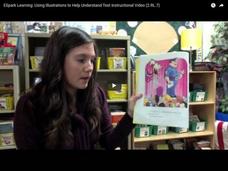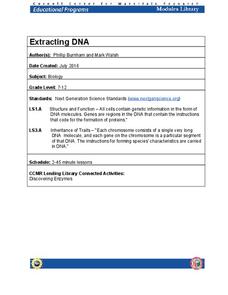Museum of Science
goREACT
Beginning Boyles and curious Curies can safely experiment with the virtual mixing of elements using this entertaining application.
Virginia Department of Education
Charles’ Law
Searching for a relatively interesting way to demonstrate Charles' Law? Here is a instructional activity in which pupils heat air inside a flask and then cool the flask to quickly cool the air. They make observations about what occurs...
NASA
Producers Make Their Own Food
During an inquiry-based lesson, scholars decide which variable to test and then design an experiment to determine the needs of producers. After two weeks, they complete a full analysis and research paper.
Curated OER
Respiration
This series opens with diagrams of experimental setups. A data table is displayed and questions are asked, indicating that the intent is for lab groups to perform the depicted experiments. At slide twelve, a coherent lesson about the...
Cornell University
Bacteria Take Over and Down
Bacteria outnumber all other forms of life on Earth. Scholars observe the growth of bacteria in petri dishes to understand their role in maintaining good health. Then, they observe the growth of bacteria after they introduce...
Serendip
How Do Muscles Get the Energy They Need for Athletic Activity?
Every muscle movement requires energy, but where does that energy come from? Scholars answer this question and more as they complete a worksheet. By following the directions, completing research, and discussing it as a class, they begin...
Serendip
Food, Energy and Body Weight
High schoolers learn why humans need calories, how they control weight with food choices, and the impact of exercise on energy. Scholars then apply their understanding to a case study of lunch choices and exercise.
Biology Junction
Plasma Membrane – Gateway to the Cell
Just as skin covers your body limiting what can go in and out, plasma membranes cover cells to do the same. Scholars begin with a presentation that gives overview of the structure and function of plasma membranes. Then, they learn how...
Curated OER
Sea Water Freeze
Learners observe how salinity affects the time it takes water to freeze. They participate in an experiment to determine that ice is essentially salt-free whether formed from fresh or salt water
Cold Spring Harbor Laboratory
Living Things Share Common Genes
Everything evolved from a common ancestor, but how did modern plants and animals develop so many more genes? Scholars use an online interactive to learn about the process. They begin to understand common genes with an animation, multiple...
Cold Spring Harbor Laboratory
A Genome Is an Entire Set of Genes
Today researchers identify a gene suspected of causing a genetic disease in a matter of days rather than years, thanks to the Human Genome Project. Young scientists learn about the Human Genome Project and the scientists who designed the...
Serendip
Using Models to Understand Cellular Respiration
Energize biologists with colorful images in an activity that captivates the imagination while demystifying the subject of cellular respiration. Participants build comprehension skills and access core content knowledge by analyzing text...
Curated OER
Cell Respiration Worksheet
Beginning biologists demonstrate their grasp on cellular respiration, photosynthesis, and energy flow though ecosystems when completing this worksheet. Fifteen multiple choice and short answer questions test their knowledge. Because of...
Curated OER
The Cell Cycle: Cell Growth, Cell Division
Help your students understand cell division. Explore the topics of mitosis by examining the details of chromosomes at interphase, metaphase, anaphase, prophase, and telophase. Wonderful slides will keep your students' attention while...
Curated OER
Acid Rain
Create a simulation of acid rain in your classroom with lemon juice and bean plants to help kids study the effects of pollution on plants. In addition, learners will listen to a story and write responses based on guiding questions.
Virginia Department of Education
Building a DNA Model
It has been decades since the discovery of DNA. Still, activities such building this DNA model allow blossoming scientists to better understand the components that form this overall structure. During this activity, they will also...
NOAA
Ocean Primary Production
A cold seep is an area on the ocean floor where hydrocarbons leak from the earth, creating entire unique biomes. Learners explore cold seeps, photosynthesis in the ocean, and its limitations due to loss of sunlight. They further explore...
Chicago Botanic Garden
Carbon, Greenhouse Gases, and Climate
Climate models mathematically represent the interactions of the atmosphere, oceans, land, sun, surface, and ice. Part two in the series of four lessons looks at the role greenhouse gases play in keeping Earth warm and has participants...
Cornell University
Extracting DNA
Uncover the basics of DNA structure through exploration activities. Collaborative groups build DNA models and recreate the process of replication. Then, using plant cells such as peas or strawberries, they extract a DNA sample.
Montana State University
Climb into Action!
Climate change affects even the largest and intimidating of landforms—even Mount Everest! A resource helps teach learners the connection between global climate change and its effects on Earth. Activities include videos, class discussion,...
Serendip
DNA Structure, Function and Replication
Before a cell replicates, its DNA must replicate. Take advantage of a hands-on guided lesson to teach budding scientists how this happens. Using a set of nucleotide cards, learners become the DNA and work to create matching strands...
NASA
Is It Alive?
Determining whether or not something is living can be more difficult than it seems. Put your young scientists to work defining their own criteria to identify life, then work with three samples to see if they are alive or not.
K12 Reader
What’s in Your Cells?
Organelles, cellular respiration, ATP, and DNA. The passage attached to this life science reading comprehension worksheet is all about cells. After reading about diffusion and osmosis, kids answer a series of questions based on the text.
Biology Junction
Energy Flow in an Ecosystem
Every living thing requires a food source, thus the interconnections in ecosystems become complex. Scholars learn about these interconnections in a presentation on energy flow. It starts with the sun and moves through many different...
Other popular searches
- Organic Molecules Proteins
- Organic Molecules of Life
- Organic Molecules Lab
- Making Organic Molecules
- Gumdrop Organic Molecules
- 4 Major Organic Molecules
- Class of Organic Molecules
- Organic Molecules or Dna
- Testing Organic Molecules
- Chemistry Organic Molecules
- Chemistry, Organic Molecules

























